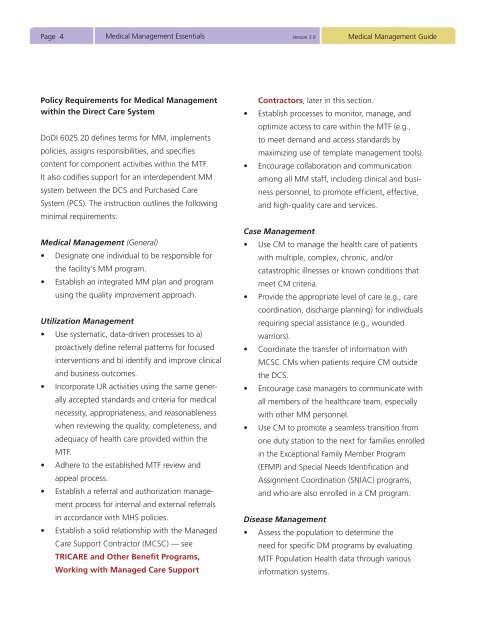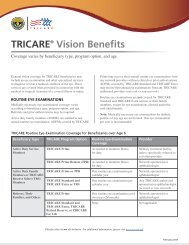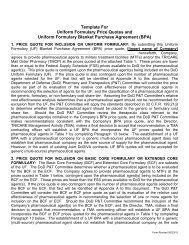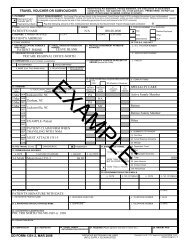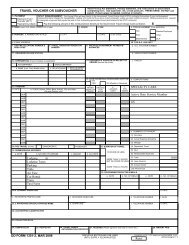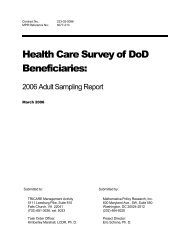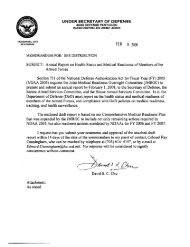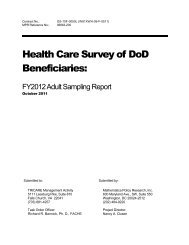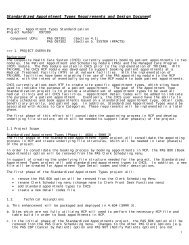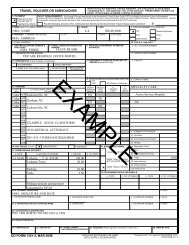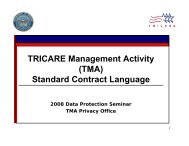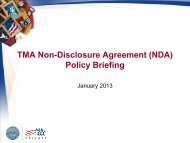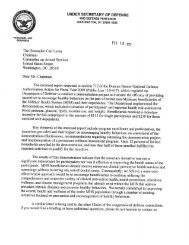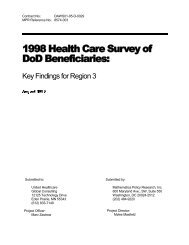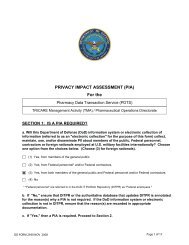Medical Management Guide, 2009, Version 3.0 - Tricare
Medical Management Guide, 2009, Version 3.0 - Tricare
Medical Management Guide, 2009, Version 3.0 - Tricare
- No tags were found...
You also want an ePaper? Increase the reach of your titles
YUMPU automatically turns print PDFs into web optimized ePapers that Google loves.
Page <strong>Medical</strong> <strong>Management</strong> Essentials<strong>Version</strong> <strong>3.0</strong><strong>Medical</strong> <strong>Management</strong> <strong>Guide</strong>Policy Requirements for <strong>Medical</strong> <strong>Management</strong>within the Direct Care SystemDoDI 6025.20 defines terms for MM, implementspolicies, assigns responsibilities, and specifiescontent for component activities within the MTF.It also codifies support for an interdependent MMsystem between the DCS and Purchased CareSystem (PCS). The instruction outlines the followingminimal requirements:<strong>Medical</strong> <strong>Management</strong> (General)• Designate one individual to be responsible forthe facility’s MM program.• Establish an integrated MM plan and programusing the quality improvement approach.Utilization <strong>Management</strong>• Use systematic, data-driven processes to a)proactively define referral patterns for focusedinterventions and b) identify and improve clinicaland business outcomes.• Incorporate UR activities using the same generallyaccepted standards and criteria for medicalnecessity, appropriateness, and reasonablenesswhen reviewing the quality, completeness, andadequacy of health care provided within theMTF.• Adhere to the established MTF review andappeal process.• Establish a referral and authorization managementprocess for internal and external referralsin accordance with MHS policies.• Establish a solid relationship with the ManagedCare Support Contractor (MCSC) — seeTRICARE and Other Benefit Programs,Working with Managed Care SupportContractors, later in this section.• Establish processes to monitor, manage, andoptimize access to care within the MTF (e.g.,to meet demand and access standards bymaximizing use of template management tools).• Encourage collaboration and communicationamong all MM staff, including clinical and businesspersonnel, to promote efficient, effective,and high-quality care and services.Case <strong>Management</strong>• Use CM to manage the health care of patientswith multiple, complex, chronic, and/orcatastrophic illnesses or known conditions thatmeet CM criteria.• Provide the appropriate level of care (e.g., carecoordination, discharge planning) for individualsrequiring special assistance (e.g., woundedwarriors).• Coordinate the transfer of information withMCSC CMs when patients require CM outsidethe DCS.• Encourage case managers to communicate withall members of the healthcare team, especiallywith other MM personnel.• Use CM to promote a seamless transition fromone duty station to the next for families enrolledin the Exceptional Family Member Program(EFMP) and Special Needs Identification andAssignment Coordination (SNIAC) programs,and who are also enrolled in a CM program.Disease <strong>Management</strong>• Assess the population to determine theneed for specific DM programs by evaluatingMTF Population Health data through variousinformation systems.


